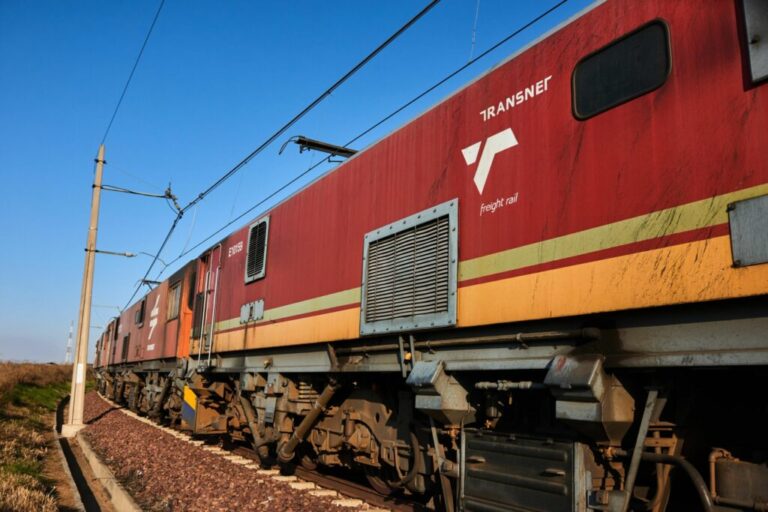You can also listen to this podcast on iono.fm here.
ADVERTISEMENT
CONTINUE READING BELOW
JEREMY MAGGS: Let’s stay with transport and Transnet veteran Michelle Phillips has been appointed to lead the state-owned rail, port and pipeline company. You’ll know well that Transnet is the beating heart of the South African economy, but at the moment is on life support. The big question, of course, is can she turn things around?
Read: Transnet appoints Phillips as group CEO
I want to give you a view now from Business Unity South Africa’s (Busa) Lunga Maloyi. Lunga, welcome and thank you very much for joining us. Michelle Phillips has more than 20 years’ experience working at Transnet. The general sense among watchers is that this is a good call.
LUNGA MALOYI: Good afternoon, Jeremy, and good afternoon to your listeners. As business, we share those sentiments. We think that they will greatly enhance stability, not only within Transnet, but also it will foster a more workable relationship between Transnet and the business sector. What we hope that this will ultimately lead to is an acceleration of the progress in terms of implementing the Transnet recovery plan as set out in the back end of last year.
JEREMY MAGGS: How would you define the current relationship between Transnet and the business sector?
LUNGA MALOYI: It’s an ever-improving relationship. We’ve had a cordial and a very good working relationship with Michelle and her team, and so it’s encouraging to see her in the permanent position of chief executive.
JEREMY MAGGS: What strength do you think she brings to the new job?
LUNGA MALOYI: Look, I think for business, I think the most encouraging thing is that through ongoing dialogue, she has shown a real approach that seeks to be consultative, but also, she has been very open to working with the private sector in terms of resolving some of the issues at Transnet.
We also believe that her years of experience within the entity itself is a good omen, as she understands the issues at hand, and we think she’s a good fit for the position of CEO.
JEREMY MAGGS: Notwithstanding the Transnet recovery plan that has been well reported on, what does Business Unity South Africa believe her top and immediate priority is?
LUNGA MALOYI: Well, we think there’s an urgent need for a turnaround at Transnet. There are obviously operational deficiencies that exist within the system, and so we would be looking to her to outline a plan in terms of how do we then improve operational performance of the various industry supply chains, including more specifically at freight rail and at ports. But also, we’ll be looking to her to implement reforms that seek to modernise the freight transport system and ultimately (restore) efficiency and competitiveness. But also, for us is to ensure that you create an enabling condition for the freight transport system to operate effectively, including … private sector participation.
JEREMY MAGGS: The biggest problem of course, that she has is government are saying no more money.
ADVERTISEMENT
CONTINUE READING BELOW
LUNGA MALOYI: That could be a challenge going forward, but I think the recent guarantee of about R47 billion is a necessary financial injection and it shows the commitment on the part of government to working towards turning the situation around at Transnet.
We hope that in future, as we then begin to really tackle some of these challenges, more financial support would be made available to the entity for it to be able to do so.
JEREMY MAGGS: Do you think there is still private sector appetite to get involved in the process itself?
LUNGA MALOYI: Yes, of course, there’s private sector interest and a real appetite. We have since June 2023 been actively working with government in a partnership to tackle some of the issues that do exist in some of our … industries, including energy. So what we have seen is that there’s been great policy and regulatory reform that look at crowding in private sector investments, and so that is something that’s very encouraging.
So, like I mentioned, there’s an ongoing relationship that we have with the government that has resulted in the formation of the National Logistics Crisis Committee (NLCC) and there we have been actively involved with the private sector in ensuring that our voice is heard in terms of how do we then begin to solve some of the issues at hand.
JEREMY MAGGS: Just a final one. There are so many moving parts within this behemoth of an organisation. One of the other big difficulties is internally to get alignment within the organisation.
LUNGA MALOYI: I think we trust Michelle and her team to ensure that there is a fair degree of alignment. I think one of the things that was very telling in the announcement of the guarantee last year by the finance minister (Enoch Godongwana), our National Treasury to be specific, was that it would be contingent on the fact that Transnet itself would not only be setting in place the recovery plan, but also working actively to implementing the freight logistics roadmap. So I think there’s a great degree of policy certainty, regulatory certainty, and we believe that that (leads towards an) alignment within the institution itself.
JEREMY MAGGS: Well, let’s see what the first 100 days delivers. Lunga Maloyi from Business Unity South Africa, thank you very much indeed.

